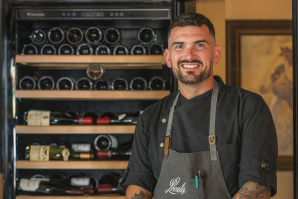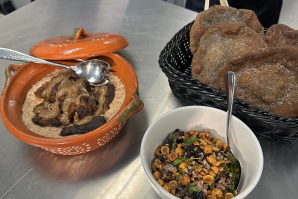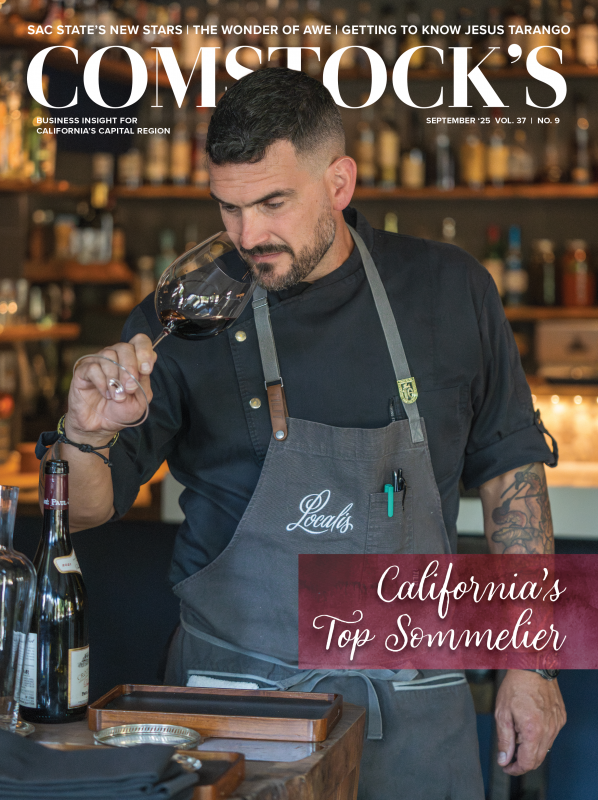Standing by a wall of bourbon barrels, comedian David Rodriguez yanks his microphone off its stand and glances at the faces crowding into Moksa Brewing Company in Rocklin on a late Tuesday. “I’m from Davis,” Rodriguez says, casually standing on a makeshift stage. “Are there any other Davis people here? Anyone else heading back to Davis later?” A couple sitting at a high-top table lift their hands. “You are, really?” Rodriguez asks, his expression brightening. “Hell yeah,” he mutters with a fist pump. “I’ve got a ride home tonight.”
As Moksa’s monthly free comedy night gets underway, the soft-spoken and understated Rodriguez launches into some jokes that are a bit on the dark side. In a way it’s thematically fitting, since the large wood barrels he’s performing in front of have the darkest kind of beer aging in them. That’s what Moksa specializes in — cutting through California’s IPA-dominated landscape with a masterful flex on the richest, milkiest, malt-forward barrel-aged stouts a fan can ask for.
In the past, being a signature player in a beer category like stouts would usually be enough to power a business model. But Moksa’s owner, Scott Williams, says that industry’s headwinds have made his operations more complicated: For three straight years, Williams and his fellow Sacramento-area brewers have dealt with price increases on raw materials, fuel costs and surcharges, along with a more existential worry about younger millennials and Gen Z changing their drink preferences.
That’s led Williams to reimagine what his brewery can be, including a live music venue and monthly comedy club. On this warm evening, the line-up of comics has brought a crowd of 30 people to Moksa during an otherwise slower time of the week. Williams knows several of his friends in local craft brewing are also expanding their horizons. Erik Schmid, owner of Red Bus Brewing Company in Folsom, is coupling his reputation for making excellent hazy IPAs with operating a scrumptious woodfire pizza kitchen and hosting vintage car meet-ups.
Meanwhile, Paul Gould and Andy Klein, owners of the Monk’s Cellar in Roseville, have turned winning statewide beer awards into a strong social media and traditional media presence, all while running their own whiskey club and offering regular events like Tacos, Tequila and Trivia Tuesday.
For Kelsey McQuaid-Craig, executive director of the California Craft Brewers Association, the instinct to branch out and create new dynamics is becoming an important one for her members. She knows that Sacramento recently had some gloomy headlines around two well-known breweries — Track 7 and Device Brewing Company — closing within five days of each other, but she argues there’s not oversaturation if breweries are rethinking their purpose and connection to local neighborhoods.
“Some of the (breweries) that are thriving are focusing on what craft beer started out as,” she says, “which means going back hundreds of years to the concept of the public house — or that gathering point for the community — and they’re providing those spaces.”
Brewers in the kitchen
It’s a blazing summer afternoon as Schmid walks by a pair of ruby VW beach vans parked near the patio of Red Bus Brewing and maneuvers into a brand-new pizza kitchen.
“When I was starting this place back in 2017, I was not interested in having a kitchen,” Schmid admits. “But you have to learn all the time, and you have to look at other things your customers might go elsewhere for.”
Regulars at Red Bus often joke about it being a proverbial second living room for Folsom. Schmid is hoping that a straightforward, tasty pizza menu will keep patrons at the brewery longer and capture some revenue from those holding firm on ordering only one beer, or no beers, during their visit.
Red Bus recently opened a new pizza kitchen, its latest gambit to
attract more customers.

Previously, Red Bus relied on an array of food trucks to extend it into a meal destination. But given how important food has become to breweries in 2025, Schmid knew he needed to be the one ensuring quality and consistency when it came to that part of the experience.
“I was probably losing a certain amount of revenue each month because people didn’t know what to expect with food,” Schmid observes.
Williams had a similar thought when he decided to bolster Moksa’s brewery with a separate dining hub anchored five miles west in Roseville. He launched a joint venture with Hawks restaurant to open Barrel House, a big food-court-style, grab-and-go eatery that pairs his beers with simple but high-caliber American fare. Since opening the alternative, food-driven location two years ago, Williams has been relieved to see that Barrel House is contributing to Moksa’s overall viability.
“It’s a completely different clientele,” Williams says.
Staying lean, mean and focused
The Monk’s Cellar is a Belgian-style beer-making business recently named Brewery of the Year by the California State Fair for the second time in three years. It is now the only establishment in the State Fair’s three-decade brewery competition to ever win the distinction twice. But owners Gould and Klein have still sensed the industry panic of late.
Tacos, Trivia and Tequila Tuesday is a regular event at Monk’s
Cellar in Roseville.

“Without speculating on specific breweries in the area that have closed, on a broader level, those ones that are heavily dependent on distribution, which has low margins, sometimes run into trouble,” Gould observes, adding that’s one reason he and Klein made pairing a brewery with a full bar and elevated gastropub part of their model from the beginning. “Monk’s Brewery is like a little engine inside of everything else. We control our production. We control the costs of what we make. And in here, the profit margins are good on all that, especially as opposed to paying a middle man.”
Monk’s, Moksa and Red Bus haven’t made huge capital investments in ramping up production with the hopes of going national or being sold across the entire West. Doing that, Gould and Klein emphasize, means relying on a massive distribution company that may or may not have a small brewery’s best interests at heart.
Schmid agrees with that assessment.
“I think it’s a trap that certain breweries fall into,” Schmid says.
The next generation
Even the most-focused breweries are up against shifting forces beyond their control. Study after study has flagged young people backing away from beer and, to some extent, drinking culture entirely. The data points have been numerous and well-publicized, including a recent World Finance report that shows Gen Zers are drinking on average 20 percent less alcohol than millennials.
McQuaid-Craig thinks the pandemic impacted young people’s relationship to social drinking.
“Gen Z came of age in lockdown,” she says. “So it wasn’t like other generations where you were going out to a college party on a weekend and hanging out. … Part of what breweries are trying to crack the code on is, ‘How do we bring people in, and then also have something that they’ll drink?’”
Recognizing a shift in sensibilities, Klein, Williams and Schmid are all making hard seltzers in their breweries now.
“I think most everyone gets into the brewing business because they’re passionate about it, but the passion can only take you so far,” Klein acknowledges.
Proving a variety of options, along with engaging live events, is starting to get younger faces at least in the orbit of beer taps again. Three Mile Brewing in Davis can pack college students in whenever it hosts musical bingo. Just a few blocks away, the taphouse University of Beer gets shoulder-to-shoulder crowds for its raucous Saturday karaoke nights. None of this surprises McQuaid-Craig.
“There’s some local breweries in Sacramento that are doing World of Warcraft Night or video game nights,” she says. “It’s about bringing in these sort of fun engagement points.”
–
Stay up to date on business in the Capital Region: Subscribe to the Comstock’s newsletter today.
Recommended For You

According to Michelin, California’s Top Sommelier Is in Sacramento
Chef Chris Barnum-Dann of Localis on his battle with darkness and rise to the top
“I wanted to be the best at everything I’ve ever done in my life,” says Chef Chris Barnum-Dann of Localis, who received the Sommelier Award from the 2025 California Michelin Guide.

Visit Sacramento Unveils Menu for Tower Bridge Dinner
The annual dinner pays homage to the first Farm-to-Fork Festival at Terra Madre Americas
Ahead of Farm to Fork at Terra Madre, Visit Sacramento recently unveiled the menu for the Tower Bridge dinner, always an epicurean event. Get a preview here.

When There’s a Still, There’s a Way
Amador County winery Iron Hub branches out with its own brandy, starting with a homemade still
Some wineries across America, from the California coast to Maine, have expanded from traditional wine making into the distilling process, using their grapes to make high octane spirits. Here’s how Amador County winemaker Tom Jones keeps his spirits up as the wine industry trends down.

Behind the Doors of Sacramento’s Small Food Factories
Three beloved local businesses prove that old-school flavors never go out of style
Deep inside the belly of Corti Brothers in East Sacramento, past the double doors marked “employees only,” past the walk-ins and shelves of goods and hustling employees, a piercing klaxon is sounding in the kitchen. Is it a fire alarm? Has a miscreant entered through a back door to burgle a jar of vintage marmalade? Much more dire: The cheese ravioli filling in the ravioli machine hopper is getting low.

100 Years Since Peak Prohibition, Revelers Still Seek Speakeasies in Sacramento
History, mystery and drink magic in the Capital's hidden bars
California’s capital was one of the wettest cities in the state
during dry Prohibition, home to a rebellious generation who
escaped into hidden drinking dens. A century later, there are
still plenty of speakeasies in Sacramento if you know where to
look.




